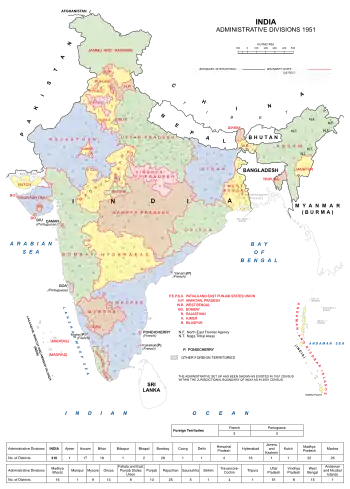1952 Coorg Legislative Assembly election
The 1952 Coorg Legislative Assembly election was held to constitute the Coorg Legislative Assembly, electing members of legislature for 18 constituencies of the erstwhile Indian State of Coorg. It took place on 27 March 1952 and a total of 87,947 people voted 24 out of 60 candidates to power. This was the only election to the assembly before the State was merged into Mysore (later renamed as Karnataka) as per the States Reorganisation Act in 1956.[1][2]

Constituencies
A total of 24 seats were up for election from 18 constituencies; six two-member constituencies and twelve single-member constituencies. No seats were reserved for Scheduled Castes or Scheduled Tribes.[3]
Contestants
Sixty candidates contested the election. The Indian National Congress presented candidates in all 24 constituencies. There were also 34 independent candidates.[3] The Takkadi Party, which campaigned against merger into Mysore State, contested as independents.[1] The Takkadi Party was led by Pandyanda Belliappa, a veteran Gandhian.[1] A third force in the election was the Communist Party of India, that only presented two candidates (C.B. Monniah in Hudikeri and B.N. Kuttappa in Siddapur).[3] No female candidates were in the fray.[3]
Results
The Indian National Congress (INC) emerged victorious, winning 15 out of the 24 seats. The INC leader C. M. Poonacha won his seat from the Berriathnad constituency, with 1,969 votes (71.37 per cent of the votes polled in the constituency). Nine independent candidates won the remaining seats. Belliappa won his seat Ammathi Nad with 1,667 votes (57.25 per cent of votes polled). INC candidates got 55.54 per cent of the votes polled statewide, independents 42.88 per cent and the two communist candidates 1.58 per cent.[3] The candidate with the highest percentage of votes polled in his favour was G. Lingarajayya, the INC candidate in Fraserpet, who polled 2,375 votes (71.64 per cent).[3]
| Political party | Flag | Candidates | Won | % of Seats | Votes | Vote % | |
|---|---|---|---|---|---|---|---|
| Indian National Congress | 24 | 15 | 62.50 | 48,845 | 55.54 | ||
| Independent | 34 | 9 | 37.50 | 37,716 | 42.88 | ||
| Communist Party of India | 2 | 0 | 1,386 | 1.58 | |||
| Total | 24 | 14 | Voters: 138,440 Turnout 87,947 (63.53 %) | ||||
Members of the Coorg Legislative Assembly, 1952
Keys: Indian National Congress (15) Independent (9)
| No. | Constituency | Name of elected MLA | Party affiliation |
|---|---|---|---|
| 1 | Sanivarasanthe | P. K. Chennayya | Indian National Congress |
| K. Mallappa | Indian National Congress | ||
| 2 | Somwarpet North | C. K. Kalappa | Indian National Congress |
| 3 | Somwarpet South | H. T. Muthanna | Independent |
| 4 | Fraserpet | G. Lingarajayya | Indian National Congress |
| 5 | Sunticoppa | Gundugutti Manjanathaya | Indian National Congress |
| P. Lakha | Indian National Congress | ||
| 6 | Mercara Town | B. S. Kushalappa | Indian National Congress |
| 7 | Murnad | C. A. Mandanna | Indian National Congress |
| 8 | Mercara Nad | P. D. Subbaiah | Indian National Congress |
| 9 | Srimangala Nad | K. P. Karumbayya | Independent |
| G. Subbaiah | Independent | ||
| 10 | Hudikeri | K. K. Ganapathy | Independent |
| 11 | Berriath Nad | C. M. Poonacha | Indian National Congress |
| 12 | Ponnampet Nad | Yeravara Belli | Indian National Congress |
| P. Nanamaya | Indian National Congress | ||
| 13 | Virajpet Town | N. G. Ahamed | Independent |
| 14 | Virajpet Nad | Harijan Nanja | Independent |
| P. C. Uthayya | Independent | ||
| 15 | Ammathi Nad | Pandyanda Belliappa | Independent |
| 16 | Siddapur | Bettakurubara Kala | Indian National Congress |
| Muruvanda Machaiah | Indian National Congress | ||
| 17 | Napoklu Nad | A. C. Thimmaiah | Independent |
| 18 | Bhagamandala Nad | Konana Devaiah | Indian National Congress |
After the election, Poonacha formed a two-member cabinet, consisting of himself as Chief Minister and Kuttur Mallapa (elected to the assembly from the Sanivarsanthe constituency) as Home Minister.[1]
See also
References
- "Coorg and the reorganisation of States". C.M. Ramachandra. The Hindu. 20 October 2013. Retrieved 14 October 2014.
- "Reorganisation of States, 1955" (PDF). The Economic Weekly. 15 October 1955. Retrieved 25 July 2015.
- "Statistical Report on General Election, 1951 : To the Legislative Assembly of Coorg". Election Commission of India. Retrieved 8 May 2020.